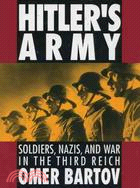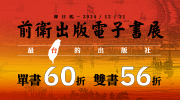Hitler's Army ─ Soldiers, Nazis, and War in the Third Reich
商品資訊
ISBN13:9780195079036
出版社:Oxford Univ Press USA
作者:Omer Bartov
出版日:1992/11/26
裝訂:平裝
規格:19.1cm*12.7cm*1.3cm (高/寬/厚)
定價
:NT$ 874 元優惠價
:90 折 787 元
無庫存,下單後進貨(到貨天數約30-45天)
下單可得紅利積點:23 點
商品簡介
作者簡介
相關商品
商品簡介
As the Cold War followed on the heels of the Second World War, as the Nuremburg Trials faded in the shadow of the Iron Curtain, both the Germans and the West were quick to accept the idea that Hitler's army had been no SS, no Gestapo, that it was a professional force little touched by Nazi politics. But in this compelling account Omer Bartov reveals a very different history, as he probes the experience of the average soldier to show just how thoroughly Nazi ideology permeated the army.
In Hitler's Army, Bartov focuses on the titanic struggle between Germany and the Soviet Union--where the vast majority of German troops fought--to show how the savagery of war reshaped the army in Hitler's image. Both brutalized and brutalizing, these soldiers needed to see their bitter sacrifices as noble patriotism and to justify their own atrocities by seeing their victims as subhuman. In the unprecedented ferocity and catastrophic losses of the Eastrn front, he writes, soldiers embraced the idea that the war was a defense of civilization against Jewish/Bolshevik barbarism, a war of racial survival to be waged at all costs. Bartov describes the incredible scale and destruction of the invasion of Russia in horrific detail. Even in the first months--often depicted as a time of easy victories--undermanned and ill-equipped German units were stretched to the breaking point by vast distances and bitter Soviet resistance. Facing scarce supplies and enormous casualties, the average soldier sank to ta a primitive level of existence, re-experiencing the trench warfare of World War I under the most extreme weather conditions imaginable; the fighting itself was savage, and massacres of prisoners were common. Troops looted food and supplies from civilians with wild abandon; they mercilessly wiped out villages suspected of aiding partisans. Incredible losses led to recruits being thrown together in units that once had been filled with men from the same communities, making Nazi ideology even more important as a binding force. And they were further brutalized by a military justice system that executed almost 15,000 German soldiers during the war. Bartov goes on to explore letters, diaries, military reports, and other sources, showing how widespread Hitler's views became among common fighting men--men who grew up, he reminds us, under the Nazi regime. In the end, they truly became Hitler's army.
In six years of warfare, the vast majority of German men passed through the Wehrmacht and almost every family had a relative who fought in the East. Bartov's powerful new account of how deeply Nazi ideology penetrated the army sheds new light on how deeply it penetrated the nation. Hitler's Army makes an important correction not merely to the historical record but to how we see the world today.
In Hitler's Army, Bartov focuses on the titanic struggle between Germany and the Soviet Union--where the vast majority of German troops fought--to show how the savagery of war reshaped the army in Hitler's image. Both brutalized and brutalizing, these soldiers needed to see their bitter sacrifices as noble patriotism and to justify their own atrocities by seeing their victims as subhuman. In the unprecedented ferocity and catastrophic losses of the Eastrn front, he writes, soldiers embraced the idea that the war was a defense of civilization against Jewish/Bolshevik barbarism, a war of racial survival to be waged at all costs. Bartov describes the incredible scale and destruction of the invasion of Russia in horrific detail. Even in the first months--often depicted as a time of easy victories--undermanned and ill-equipped German units were stretched to the breaking point by vast distances and bitter Soviet resistance. Facing scarce supplies and enormous casualties, the average soldier sank to ta a primitive level of existence, re-experiencing the trench warfare of World War I under the most extreme weather conditions imaginable; the fighting itself was savage, and massacres of prisoners were common. Troops looted food and supplies from civilians with wild abandon; they mercilessly wiped out villages suspected of aiding partisans. Incredible losses led to recruits being thrown together in units that once had been filled with men from the same communities, making Nazi ideology even more important as a binding force. And they were further brutalized by a military justice system that executed almost 15,000 German soldiers during the war. Bartov goes on to explore letters, diaries, military reports, and other sources, showing how widespread Hitler's views became among common fighting men--men who grew up, he reminds us, under the Nazi regime. In the end, they truly became Hitler's army.
In six years of warfare, the vast majority of German men passed through the Wehrmacht and almost every family had a relative who fought in the East. Bartov's powerful new account of how deeply Nazi ideology penetrated the army sheds new light on how deeply it penetrated the nation. Hitler's Army makes an important correction not merely to the historical record but to how we see the world today.
作者簡介
Omer Bartov is Visiting Raoul Wallenberg Professor at Rutgers University, and is the author of The Eastern Front, 1941-1945.
主題書展
更多
主題書展
更多書展今日66折
您曾經瀏覽過的商品
購物須知
外文書商品之書封,為出版社提供之樣本。實際出貨商品,以出版社所提供之現有版本為主。部份書籍,因出版社供應狀況特殊,匯率將依實際狀況做調整。
無庫存之商品,在您完成訂單程序之後,將以空運的方式為你下單調貨。為了縮短等待的時間,建議您將外文書與其他商品分開下單,以獲得最快的取貨速度,平均調貨時間為1~2個月。
為了保護您的權益,「三民網路書店」提供會員七日商品鑑賞期(收到商品為起始日)。
若要辦理退貨,請在商品鑑賞期內寄回,且商品必須是全新狀態與完整包裝(商品、附件、發票、隨貨贈品等)否則恕不接受退貨。
























